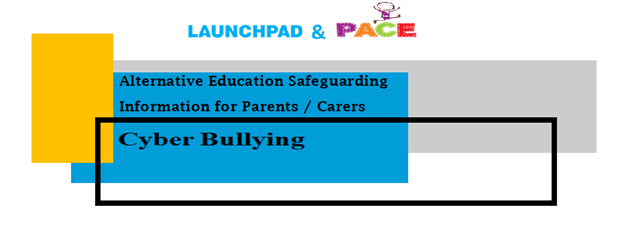Cyber Bullying

It has been reported to the Safeguarding Team that some pupils have allegedly used social media whilst at home to deliberately upset, and provoke undue malice towards other pupils.
We would like to encourage all parents to communicate with their children about internet usage, in particular highlighting the seriousness of bullying and harassment.
Definitions:
Bullying: Behaviours by an individual or group, repeated over time, that intentionally hurts another individual or group either physically or emotionally. This includes any repeated words or actions, which are aimed at causing someone to feel frightened, miserable and helpless. Bullying can take many forms, including:
Verbal: e.g. name calling, sarcasm, threatening & teasing
Physical: e.g. Pushing, hitting, kicking, punching or any use of physical aggressive contact
Social: e.g. ignoring, spreading rumours or treating someone like an outsider
Psychological: e.g. stalking & intimidation
Cyber-bullying: ‘Virtual’ bullying using technology (e.g. Chat rooms, instant messaging, email and mobile phone) which can occur outside School. Cyberbullying can happen at all times of the day, with a potentially bigger audience, as people can forward on content very quickly and easily
Harassment: Any conduct which is unwanted by a learner, which affects the dignity of the pupil or group of pupils in the School. Harassment may be repetitive or an isolated occurrence against one or more pupils
We hope and that we can work together to educate pupils about the immense emotional damage caused by cyber bullying.
We treat online safety seriously and will continue to educate pupils as part of our safeguarding curriculum about staying safe online.
As a school we will act to support the authorities in dealing with cyber bullies. This may involve passing on information that we have. We may even consider exclusions for any pupil involved.
Because these incidents have happened outside of school they are dealt with by the Police. Such behaviours are subject to legal action under the following laws:
- The Protection from Harassment Act 1997
- Malicious Communications Act 1988
- Section 127 of the communications Act 2003
- Public Order Act 1986
- The Defamation Acts of 1952 & 1996
Children under the age of 13 should in no way be using social networking sites. Children under the age of 18 should also in no way be playing rated 18 video games and networking online – it is a violation of their terms and conditions.
In such cases, we strongly recommend that parents/carers take action to delete their childs account and remove any rated 18 games.
One of the most effective methods to prevent dangerous behaviour recommended by CEOP (Child Exploitation and Online Protection Centre) is to move computers from bedrooms into family rooms.
We suggest that you communicate with your child about their behaviour and actions online. Other useful websites with guidance include:
- kidsmart,.co.uk - Chatting online and Child safety – A guide for parents and Carers on how to help Children keep safe while Chatting
The chat provider should also provide links to other online safety guides so that if you want to find out more about keeping safe you can.
Such sites include:
Rated 18 computer games
It has been reported to the Safeguarding Team that some children have access to rated 18+ video games.
Whilst at home some pupils play these games online and interact with one another. This has brought several issues into school.
May we remind parents/carers of the negative impact of allowing your child to play 18+ video games.
Games such as Grand Theft Auto and Call of Duty are both 18+. Grand Theft Auto, for example, is well known for being extremely violent, sexual and using drug imagery. It glorifies crime and violence. The game also allows you to:
- Murder innocent people (gun and knife crime)
- Steal
- Assault
- Shoot guns
- Build a drug farm / deal drugs such as cocaine, cannabis etc.
- Have sexual encounters with prostitutes
- Attend adult strip clubs
- Be chased by the police
This game also gives you the ability to commit pretty much any crime you wish in a virtual world. You can kill a bystander in broad daylight with a weapon of choice. You can even use bombs to blow things up and kill Police Officers or prostitutes.
Research shows that exposure to violent video games can be an underlying risk factor for increased aggressive thoughts, feelings and behaviour, and a decreased empathy and prosocial behaviour.
Ratings are seen as a guideline to parents when buying video games. Our concern is that many parents do not have enough knowledge about what their child is playing, and might not approve if they were shown.
We advise parents/carers to research games before buying them, especially if they are rated 18+.





